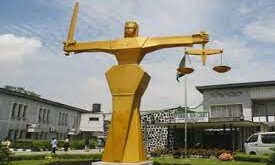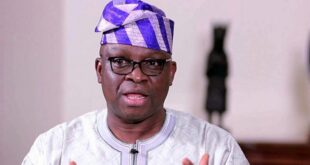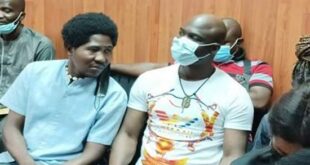HON. JUSTICE ABUBAKAR SADIQ UMAR:

Hon. Justice Abubakar Sadiq Umar, a nominee for the Supreme Court Judgeship from Kebbi State. Born on February 22, 1960, in Kebbi State, Justice Umar’s educational journey includes attending Mallam Salihu Primary School, Koko, Central Primary School, Birnin-Kebbi, Government Secondary School, Kamba, State College of Arts and Science, Sokoto, Ahmadu Bello University, Zaria, and the Nigerian Law School, Lagos. He pursued postgraduate studies at the Institute of Advanced Legal Studies, Lagos, Royal Institute of Public Administration, London, and the University of Johannesburg, South Africa. Justice Umar became a judge of the High Court of the Federal Capital Territory in 2003 and was elevated to the Court of Appeal in 2018.

HON. JUSTICE CHIOMA E. NWOSU-IHEME

Background: Hon. Justice Chioma E. Nwosu-Iheme, a nominee for the Supreme Court Judgeship from Imo State. Born on February 2, 1959, in Nkwerre LGA, Imo State, Hon. Justice Nwosu-Iheme’s educational journey includes earning her LL.B from the University of Lagos in 1981 and being called to the Bar in 1982. She was appointed a judge of the High Court of Imo State in 1995 and elevated to the Court of Appeal on February 15, 2008. She holds a doctorate degree from the University of Nigeria, Enugu Campus.
Family Affiliations:
Married to Hon. (Chief) Uzoma Nwosu-Iheme, a successful businessman and entrepreneur, their union has produced successful children, including her daughter, a Medical Doctor. Notably, one of her sons is married to Hon. Justice Njideka Nwosu-Iheme, the last child of former Rivers State Governor, Dr. Peter Odili, and Hon. Justice Mary Odili Peter-Odili, JSC, rtd.
Controversial/High Profile Cases:
Justice Nwosu-Iheme gained national attention for presiding over the “Otokoto Saga,” a notorious case involving the killing and beheading of a minor. While she convicted and sentenced all defendants to death, the Supreme Court later discharged the appellant in Ajaegbo v State (2018) LPELR-44531(SC), overturning the trial court’s decision. Additionally, she faced personal adversity in 2019 when she was kidnapped in Benin and held for two weeks.
In 2021, while serving at the Court of Appeal, Awka Division, Justice Nwosu-Iheme dismissed an application seeking the nullification of former CBN Governor Professor Chukwuma Soludo as governorship candidate of APGA in the case of Jude Okeke v Professor Chukwuma Soludo & Ors.
Patterns in Case Assignments:
No discernible patterns were found in case assignments related to high political or public interest, and there is no recorded total number of cases handled by Hon. Justice Nwosu-Iheme.
Conflict of Interest:
The analysis found no established links between Hon. Justice Nwosu-Iheme and litigants, indicating an absence of conflicts of interest.
Recurrence of Technical Reasons Behind Judgments; Miscarriage of Justice; and Incorrect Application of Law and Facts:
Concerns have been raised about the handling of high-profile and/or political cases by Hon. Justice Nwosu-Iheme, suggesting that some judgments could have been decided differently, as observed in the case of Ajaegbo v State (2018) LPELR-44531(SC).
Disciplinary Issues/Indictments:
There are no recorded disciplinary issues or indictments against Hon. Justice Nwosu-Iheme.
HON. JUSTICE MOORE ASEIMO A. ADUMEIN:

Background: Hon. Justice Moore Aseimo A. Adumein, a nominee for the Supreme Court Judgeship from Bayelsa State. Born on May 6, 1964, in Bayelsa State, Justice Adumein’s educational journey includes primary and secondary schooling in Lagos, followed by studies at the University of Lagos from 1981-1984. He completed law school in 1985 and was called to the bar the same year. In 2004, he pursued a Post Graduate Certificate in Corruption Studies at the University of Hong Kong. Initially appointed a High Court judge in 2001, he was elevated to the Court of Appeal in 2010.
Controversial/High Profile Cases:
Justice Adumein gained attention as the head of the Appeal Court panel that upheld the judgment of the Kano Governorship Election Petition Tribunal, affirming the APC candidate, Nasiru Gawuna, as the winner of the governorship election in the state (Abba Yusuf & Anor v All Progressives Congress & Ors).
Patterns in Case Assignments:
No discernible patterns were found in case assignments related to high political or public interest, and there is no recorded total number of cases handled by Hon. Justice Adumein.
Conflict of Interest:
While the analyst could not establish direct links between Hon. Justice Adumein and litigants, a potential conflict of interest is inferred through his promotion shortly after the controversial decision in the case of Abba Yusuf & Anor v All Progressives Congress & Ors.
Recurrence of Technical Reasons Behind Judgments; Miscarriage of Justice; and Incorrect Application of Law and Facts:
Concerns have been raised about the handling of high-profile and/or political cases by Hon. Justice Adumein, suggesting that some judgments could have been decided differently, as observed in the case of Abba Yusuf & Anor v All Progressives Congress & Ors.
Disciplinary Issues/Indictments:
There are pending petitions to the National Judicial Council regarding the judgment in Abba Yusuf & Anor v All Progressives Congress & Ors.
HON. JUSTICE STEPHEN ADAH:

Background: Hon. Justice Stephen Adah, a nominee for the Supreme Court Judgeship from Kogi State. Born on June 13, 1957, Justice Adah, the presiding Justice of the Asaba Division of the Court of Appeal, hails from Dekina Local Government Area of Kogi State. His educational journey includes completing his LL.B in 1981 from Ahmadu Bello University, Zaria, and being called to the Bar in 1982. He was appointed a judge of the Federal High Court on November 12, 1998, and later elevated to the Court of Appeal on November 5, 2012.
Controversial/High Profile Cases:
Justice Adah has played a pivotal role in several significant cases. Notable instances include granting motions related to serving petitions to political figures, delivering a landmark decision in the appeal filed by the EFCC against Robert Azibaola, setting aside indictments against Sambo Dasuki, and rejecting a bail request by Abba Kyari. He also led a panel that affirmed the conviction of former Plateau State governor, Mr Dariye, for diverting public funds.
Patterns in Case Assignments:
While there is no record of the total number of cases handled by Hon. Justice Adah, he has been consistently involved in a large number of political and high-profile cases. His division is frequently the destination for high-profile appeals, and he is commonly on panels for such cases.
Conflict of Interest:
The analysis found no established links between Hon. Justice Adah and litigants, indicating an absence of conflicts of interest.
Recurrence of Technical Reasons Behind Judgments; Miscarriage of Justice; and Incorrect Application of Law and Facts:
Concerns have been raised about the handling of high-profile and/or political cases by Hon. Justice Adah, suggesting that some judgments could have been decided differently.
Disciplinary Issues/Indictments:
No disciplinary issues or indictments have been recorded against Hon. Justice Adah.
HON. JUSTICE MOHAMMED BABA IDRIS:

Background: Hon. Justice Mohammed Baba Idris, a nominee for the Supreme Court Judgeship from Niger State. Born on October 25, 1970, in Lavun, Niger State, Justice Idris is the youngest among the newly recommended justices to the apex court. His educational journey includes attending Zarumai Primary School, Minna, and Federal Government College, Minna, before proceeding to Kings College, Lagos. He obtained his LL.B from Uthman Dan Fodio University, Sokoto, in 1992, and was called to the bar in 1993. Before joining the judiciary, he worked in leading law firms in Nigeria and served as Head of the Legal and Chartering departments of Oando Supply & Trading Company Limited. He became a judge of the Federal High Court in 2008 and rose to become a justice of the appeal court in 2018.
Controversial/High Profile Cases:
Justice Mohammed Baba Idris led a three-man panel that upheld the conviction of international fraudster Scales Olatunji for defrauding the Norwegian government and its citizens of N525 million. Olatunji was convicted for internet fraud and money laundering charges by a Federal High Court in Uyo, Akwa Ibom State.
Patterns in Case Assignments:
No discernible patterns were found in the way the Chief Justice of the Court of Appeal assigns cases of high political or public interest to Hon. Justice Idris, and there is no record of the total number of cases he handled.
Conflict of Interest:
The analysis found no established links between Hon. Justice Idris and litigants, indicating an absence of conflicts of interest.
Recurrence of Technical Reasons Behind Judgments; Miscarriage of Justice; and Incorrect Application of Law and Facts:
Concerns have been raised about the handling of high-profile and/or political cases by Hon. Justice Idris, suggesting that some judgments could have been decided differently.
Disciplinary Issues/Indictments:
No disciplinary issues or indictments have been recorded against Hon. Justice Idris.
HON. JUSTICE OBANDE FESTUS OGBUINYA’S JUDICIAL RECORD:

Background: Hon. Justice Obande Festus Ogbuinya, a nominee for the Supreme Court Judgeship from Ebonyi State. Born on June 16, 1965, in Ohaukwu LGA of Ebonyi State, Justice Ogbuinya’s educational journey led him to the University of Nigeria, Nsukka, where he obtained his LL.B. He was called to the Nigerian Bar in 1989 and appointed as a judge in 2002, with elevation to the Court of Appeal in 2010.
Controversial/High Profile Cases:
In a dissenting judgment, Justice Ogbuinya challenged the Kogi State Governorship Election Tribunal’s decision on Governor Yahaya Bello’s participation in the election, voiding the INEC declaration based on a breach of the Electoral Act. He also played a role in setting aside a Federal High Court judgment against the Federal Airports Authority of Nigeria (FAAN) in the case of Federal Airports Authority of Nigeria (FAAN) v. Best Quality Products and Marketing Ltd.
Patterns in Case Assignments:
No discernible patterns were found in case assignments related to high political or public interest, and there is no recorded total number of cases handled by Hon. Justice Ogbuinya.
Conflict of Interest:
The analysis found no established links between Hon. Justice Ogbuinya and litigants, indicating an absence of conflicts of interest.
Recurrence of Technical Reasons Behind Judgments; Miscarriage of Justice; and Incorrect Application of Law and Facts:
Concerns have been raised about the handling of high-profile and/or political cases by Justice Ogbuinya, suggesting that some judgments could have been decided differently, such as in the cases of Idris Wada & Or Vs. Alhaji Yahaya Bello & Ors and Federal Airports Authority of Nigeria (FAAN) v. Best Quality Products and Marketing Ltd.
Disciplinary Issues/Indictments:
There are no recorded disciplinary issues or indictments against Hon. Justice Ogbuinya.
HON. JUSTICE JUMMAI HANNATU C. SANKEY:

Background: Hon. Justice Jummai Hannatu C. Sankey, a nominee for the Supreme Court Judgeship from Plateau State. A highly esteemed justice, Hon. Justice Sankey hails from Du, Jos South, Plateau State. Her educational journey includes attending schools in London, Kaduna, and Jos before obtaining her LL.B from Ahmadu Bello University Zaria in 1979. She was called to the bar in 1980. Appointed as a judge of Plateau State High Court in 1993, she later became a Court of Appeal Justice in 2006, currently ranking as the 4th most senior justice of the Court of Appeal.
Controversial/High Profile Cases:
In 2016, Justice Sankey and two other justices recused themselves from cases involving Eyitayo Jegede due to allegations of bribery. A petition accused them of receiving a bribe of N350 million from then-Ondo State governor Olusegun Mimiko. The petition suggested that Justice Sankey received N100 million of the alleged bribe. Despite the controversy, she later led a three-man panel affirming the election victory of Ebonyi State governor, Francis Ogbonna Nwifuru, of the All Progressives Congress in the March 2023 governorship elections.
Patterns in Case Assignments:
No discernible patterns were found in case assignments related to high political or public interest, and there is no recorded total number of cases handled by Hon. Justice Sankey.
Conflict of Interest:
The analysis found no established links between Hon. Justice Sankey and litigants, indicating an absence of conflicts of interest.
Recurrence of Technical Reasons Behind Judgments; Miscarriage of Justice; and Incorrect Application of Law and Facts:
Concerns have been raised about the handling of high-profile and/or political cases by Hon. Justice Sankey, suggesting that some judgments could have been decided differently, as observed in the case of Ifeanyi Odii & Anor v Francis Ogbonna Nwifuru & Ors.
Disciplinary Issues/Indictments:
Justice Sankey has been petitioned on allegations of bribery to the tune of N350 million in the Eyitayo Jegede’s case.
HON. JUSTICE HARUNA SIMON TSAMMANI:

Background: Hon. Justice Haruna Simon Tsammani, a nominee for the Supreme Court Judgeship from Bauchi State. Born on November 23, 1959, in Tafawa Balewa LGA of Bauchi State, Justice Tsammani has a rich educational background. He attended LEA Primary School, Tafawa Balewa; Government Secondary School, Maiduguri; and Ahmadu Bello University, Zaria. After being called to the bar in 1983, he pursued postgraduate studies at the Institute of Advanced Legal Studies, University of Lagos, Abubakar Tafawa Balewa University, Bauchi, and the University of Jos. He began his judicial career as a High Court judge in Bauchi State in 1998 and was elevated to the Court of Appeal on July 16, 2010, currently holding the 11th position on the seniority list.
Controversial/High Profile Cases:
Justice Tsammani has presided over various election and financial matters, including the VAT case between Rivers State Government and the federal government. Notably, he chaired the Presidential Election Petition Court that dismissed the petition against the election of President Bola Tinubu by former Vice President Atiku Abubakar and Mr. Peter Obi.
He delivered judgements affirming the second term election of Governor Yahaya Bello of Kogi State and handed back control of APC in Kano State to outgoing Governor Abdullahi Ganduje. He also issued an order restraining Rivers and Lagos state governments from taking action on their bids to collect VAT.
In October 2021, he led a panel that dismissed a suit by the suspended National Chairman of the PDP, Uche Secondus. Additionally, he led the panel that gave the October 2022 judgement suspending the release of Nnamdi Kanu, leader of the proscribed Indigenous People of Biafra, from custody.
Patterns in Case Assignments:
No discernible patterns were found in the assignment of cases of high political or public interest to Hon. Justice Tsammani, and there is no record of the total number of cases handled by him. However, it is observed that he frequently adjudicates political and high-profile cases, likely due to his role in the Abuja Division of the Court of Appeal.
Conflict of Interest:
No possible links between Hon. Justice Tsammani and litigants were established, indicating an absence of conflicts of interest.
Recurrence of Technical Reasons Behind Judgements; Miscarriage of Justice; and Incorrect Application of Law and Facts:
Concerns have been raised about the handling of some high-profile and/or political cases by Hon. Justice Tsammani, suggesting that some judgments could have been decided differently.
Disciplinary Issues:
No disciplinary issues have been recorded against Hon. Justice Tsammani.
HON. JUSTICE JAMILU YAMMAMA TUKUR:

Background: Hon. Justice Jamilu Yammama Tukur, a nominee for the Supreme Court Judgeship from Katsina State. Born on April 7, 1960, in Katsina State, Justice Tukur’s educational journey includes primary education at Dudi Primary School, Malumfashi, Katsina State (1966-1973), Government Secondary School, Malumfashi, Katsina State (1973-1977), and LL.B from Ahmadu Bello University, Zaria in 1982. After completing the Nigerian Law School in 1983, he was called to the bar. He became a judge of the High Court of FCT in April 2007 and was elevated to the Court of Appeal on March 24, 2014.
Controversial/High Profile Cases:
In 2019, Justice Tukur delivered the leading judgment of the Court of Appeal in Lagos, declaring the imposition of fines by the Lagos State Traffic Management Authority (LASTMA) illegal and unconstitutional. He was also part of the panel that dismissed a challenge to the constitutionality of Section 24(1) of the Cybercrime Act, 2015, affirming its clarity and consistency with constitutional provisions.
Patterns in Case Assignments:
No discernible patterns were found in the assignment of cases of high political or public interest to Hon. Justice Tukur. There is no record of the total number of cases handled by him.
Conflict of Interest:
No possible links between Hon. Justice Tukur and litigants were established, indicating an absence of conflicts of interest.
Recurrence of Technical Reasons Behind Judgements; Miscarriage of Justice; and Incorrect Application of Law and Facts:
Concerns have been raised about the handling of some high-profile and/or political cases by Hon. Justice Tukur, suggesting that some judgments could have been decided differently.
Disciplinary Issues:
No disciplinary issues have been recorded against Hon. Justice Tukur.
Citizens’ Gavel remains dedicated to promoting transparency, accountability, and public awareness in the legal system by providing unbiased insights into the backgrounds and track records of judicial nominees.
ABOUT GAVEL: Citizens’ Gavel is a civic tech NGO that aims to create a world where justice delivery is fast, transparent, and efficient regardless of economic or political demographics.
Signed
Rachael Adio
Communications Associate, Citizens’ Gavel.
Subscribe to the Advocate News letter and receive news updates daily in your inbox.
 Advocate.ng Latest news update on politics, entertainment, sport and more
Advocate.ng Latest news update on politics, entertainment, sport and more




